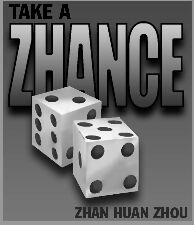
Spring 2000
Fall 1999
Winter 1999
Fall 1998
Spring 1998
Fall 1997
©2000 Zhan Huan Zhou
Updated Jan-01-2000
Please email me for comments, corrections, or suggestions.
The Power of None
©1999 Zhan Huan Zhou, Winter 1999, Issue 1
Imagine a world in which Newton or Hitler had never been born. The world as we know it would be so much different. Just think about not having to study Classical Physics in class. Or how the world would be like without World War II. These two individuals are undoubtedly two very influential figures in human history. Or are they?
What makes a historical figure "Great" or "influential?" Why are the names Alexander, Cyrus, or Catherine appended with "the Great?" What did they do that makes them any more great than one of their soldiers? After all, without the help of their army, it would have been impossible for them to have conquered any land at all. Indeed, what is a great general without an infantry to command? An army, however, is easy to replace it is more difficult to replace a great leader. Obviously the leader is more influential in history because he is commanding people and affecting thousands of people by his choices. Or is it that obvious. What about the individual in the army, is he any less influential in history than the leader?
Before any rash conclusions are drawn, the situation must first be examined in more detail. First suppose that this one soldier seriously considers revolting against his leader and take leadership himself, but then decides against it. Is his non-action that allows matters to progress as they are just as important as his leaders actions that make a noticeable change in the world? Now, suppose this individual is replaced with another soldier in the barracks. Very little difference is seen the entire army as a whole, but the consequences of this event has repercussions that echo through all time to follow. For example, different blades of grass get trampled on, different soldiers are slaughtered. The outcome of the battle is the same, but is all of history to follow the same? Perhaps one of the soldiers that was killed in one situation but not the other was the ancestor of someone who would one day invade Poland and annex Austria. Which raises the issue, if Hitlerís mother just as influential as young Adolf or perhaps even more since she resides further in the past.
This leads to the next argument that people and events become more influential the farther into the future we go from the event. Newton and Hitler were influential in shaping the modern world, but are they more or less important than the hominid that made the first stone tools or the ape that came out of the trees? This is a little more difficult to gauge, but one of these individuals must be more influential than the others, doesnít it? There is no basis or rationale for the conjecture mentioned in the previous sentence. If we take the total number of things that are affected by a certain event or person as a measure, the one most remotely in the past, the beginning of all things, must be the most influential. But isnít the first non-event in the past, the birth of apathy, even more important since it (didnít) happened before the beginning to make a change?
Simply put, one cannot gauge the influence of magnitude of any event because what makes a change any more significant than a non-change?
Think about it, just by sitting there and doing nothing, given enough time you are just as influential as Newton and Hitler.